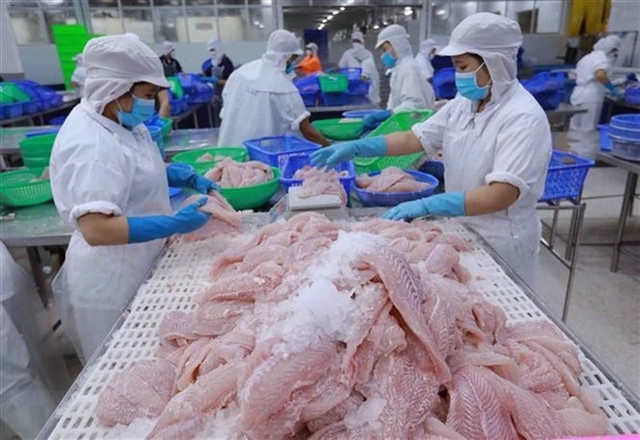 |
| Workers at a seafood processing plant in the southern province of Bình Dương. VNA/VNS Photo |
Vietnam's seafood exports can reach the US$9.5 billion milestone in 2024, according to the Vietnam Association of Seafood Exporters and Producers (VASEP).
The association's chairwoman, Nguyễn Thị Thu Sắc, said the Southeast Asian economy's seafood sector finished the year 2023 with $9 billion in export value, an 18 per cent decrease compared to the previous year.
She said high inflation, reduced demand, large inventories, decreased export prices, challenges and shortcomings in domestic production and business, such as increased input costs throughout the supply chain, and IUU yellow cards, hindered seafood exports in the past year.
But positive signals have been seen in the early months of 2024, with a 64 per cent increase in demand compared to the same period in 2023, reaching $750 million. All major product categories experienced significant improvement compared to the same period last year with China being the most notable breakthrough, reporting an increase of more than three times. Exports to the US have increased by 63 per cent, Japan by 43 per cent and the EU by 34 per cent.
She said while growth has not been equally distributed among the sector, promising early figures will play an important role in its recovery this year.
"There are still challenges and issues to overcome such as oversupply, high inventories, lower prices, and increased competition but we anticipate stronger demand and higher prices in the second half of the year as prices typically climb as inventories decrease," she said.
According to VASEP, new challenges such as tensions in the Red Sea leading to increased transportation costs, IUU yellow cards and anti-subsidy taxes will likely pose additional difficulties for businesses this year. Businesses must start taking measures to turn these challenges into opportunities, exploiting and developing suitable products for international markets.
"We still hope that Vietnamese shrimp will not be subject to anti-subsidy taxes, and the seafood industry will remove IUU yellow cards as quickly as possible," she added.
The chairwoman reaffirmed that VASEP, along with the business community, remains committed to making every effort, being proactive and dynamic to ensure quality, food safety and traceability, and towards the goal of enhancing the competitive capacity and sustainable development of the seafood industry.
She advised Vietnamese exporters to invest in improving the quality and safety of Vietnamese seafood brands while increasing their presence in traditional markets and further penetrating potential markets such as India, the Middle East, and ASEAN. VASEP emphasised the importance of high-quality raw materials in global seafood production and business.
"We need a large quantity of goods and, more importantly, high-quality raw materials, legally sourced at the most reasonable cost," she said.
She said the business community maintains high hopes for continued collaboration with the central government and ministries in administrative reform, additional support to overcome difficulties and obstacles for businesses, and improved competitive capacity for both businesses and the seafood industry. VNS